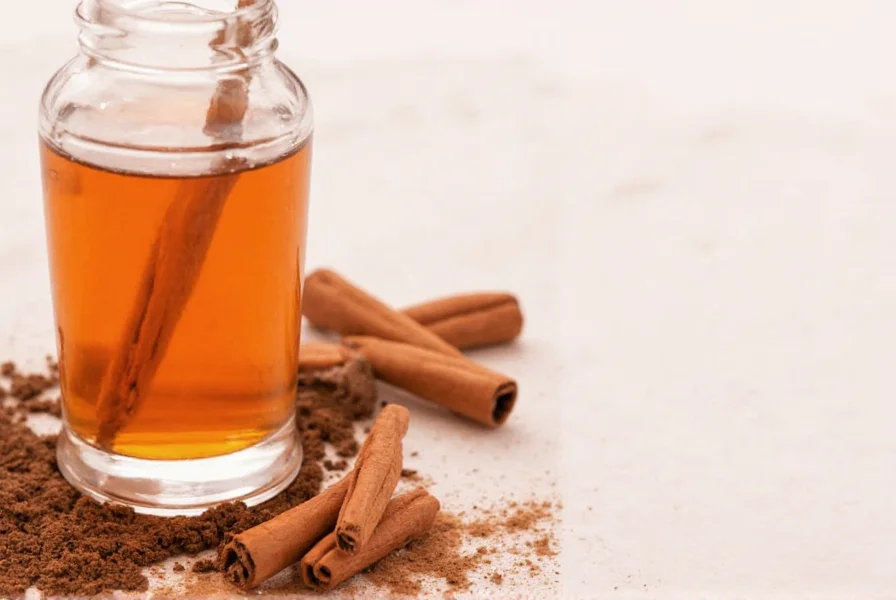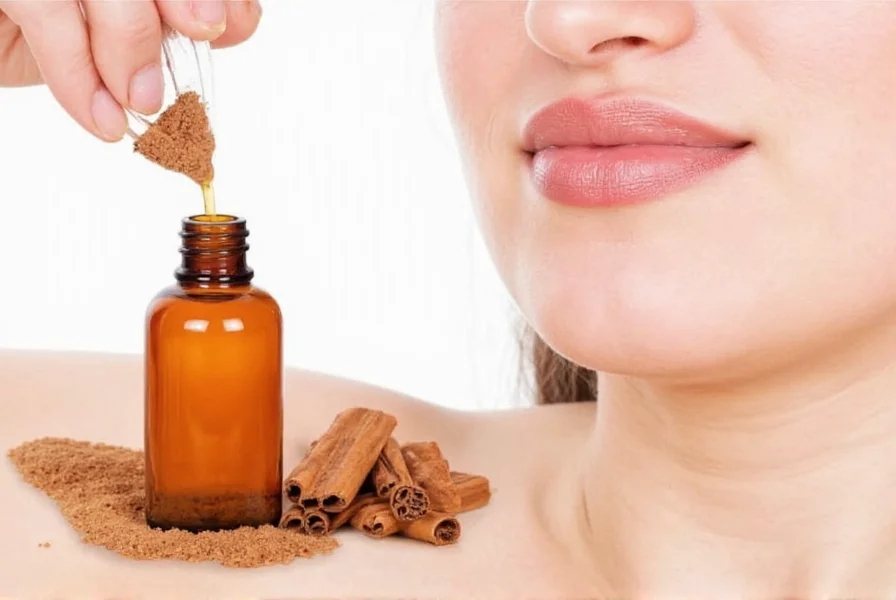The Science Behind Cinnamon in Oral Care
Cinnamon contains cinnamaldehyde, the compound responsible for its distinctive flavor and aroma, which also demonstrates significant antimicrobial activity against common oral pathogens. Research published in the Journal of Contemporary Dental Practice confirms that cinnamaldehyde effectively inhibits Streptococcus mutans, the primary bacteria responsible for tooth decay. This natural compound disrupts bacterial cell membranes, reducing plaque formation and gingivitis risk without the alcohol content found in many commercial mouth rinses.
Unlike synthetic antimicrobials like chlorhexidine, cinnamon offers a more balanced approach to oral microbiome management. While chlorhexidine can cause staining and alter taste perception with prolonged use, cinnamon mouthwash typically provides gentler, more sustainable bacterial control. However, it's important to note that natural cinnamon mouthwash formulations generally lack fluoride, which remains essential for enamel remineralization and cavity prevention.
Documented Benefits of Cinnamon Mouthwash
Multiple studies highlight specific advantages of incorporating cinnamon into oral hygiene routines. A 2022 clinical trial demonstrated that participants using cinnamon-based mouth rinse experienced a 32% reduction in plaque index scores after four weeks compared to baseline measurements. The anti-inflammatory properties of cinnamon also help soothe minor gum irritations, making it particularly beneficial for individuals with early-stage gingivitis.
Natural breath freshening represents another significant advantage of cinnamon mouthwash benefits. The essential oils in cinnamon neutralize volatile sulfur compounds responsible for bad breath more effectively than mint-based products alone. For those seeking alcohol-free mouthwash alternatives, cinnamon formulations typically use water or glycerin bases, eliminating the burning sensation associated with traditional alcohol-containing rinses.
| Feature | Cinnamon Mouthwash | Traditional Alcohol-Based | Fluoride Rinse |
|---|---|---|---|
| Active Antimicrobial | Cinnamaldehyde | Alcohol (18-26%) | Sodium fluoride |
| Cavity Prevention | Indirect (bacteria reduction) | Minimal | Direct (enamel strengthening) |
| Gum Health Support | High (anti-inflammatory) | Moderate | Low |
| Breath Freshening Duration | 2-3 hours | 1-2 hours | 1-2 hours |
| Suitable for Sensitive Mouths | Generally yes | Rarely | Usually |
Potential Concerns and Proper Usage Guidelines
While cinnamon mouthwash natural benefits are notable, proper usage is essential to avoid potential side effects. Concentrated cinnamon oil can cause oral mucosal irritation in sensitive individuals, particularly when used undiluted. Dental professionals recommend diluting cinnamon extracts in a 1:10 ratio with water or using commercially prepared formulations that maintain safe concentration levels. The American Dental Association suggests limiting use to once daily to prevent potential tissue irritation while still gaining antimicrobial benefits.
Individuals with existing canker sores or oral lichen planus should exercise caution with cinnamon mouthwash for sensitive gums, as the compound may exacerbate these conditions. Pregnant women and children under six should consult with their dentist before incorporating cinnamon-based oral products into their routine. For optimal results, swish for 30 seconds after brushing to allow the active compounds to interact with oral surfaces without immediately rinsing away toothpaste fluoride.

Integrating Cinnamon Mouthwash into Your Oral Care Routine
Cinnamon mouthwash works best as a complementary component of a complete oral hygiene regimen rather than a replacement for standard practices. Dental hygienists recommend using it in the evening after brushing to maximize overnight bacterial control. For those interested in natural oral care solutions, homemade cinnamon mouthwash recipes typically combine 10-15 drops of food-grade cinnamon essential oil per cup of distilled water, though commercial products offer more consistent concentrations.
When selecting a cinnamon mouthwash for gum health, look for products that combine cinnamon with other beneficial ingredients like tea tree oil or aloe vera to enhance soothing properties. Avoid formulations with high sugar content, which defeats the purpose of bacterial control. The most effective cinnamon-based rinses maintain a neutral pH to avoid enamel erosion while delivering sufficient cinnamaldehyde concentration (typically 0.05-0.1%) for antimicrobial effects.

Who Benefits Most from Cinnamon Mouthwash?
Certain demographics may find particular value in cinnamon-based oral rinses. Individuals seeking natural alternatives to commercial mouthwashes often prefer cinnamon formulations for their pleasant flavor and absence of artificial colors or preservatives. People with early signs of gingivitis may benefit from cinnamon's anti-inflammatory properties, while those with chronic bad breath might appreciate its longer-lasting freshness compared to mint-only products.
However, patients with advanced periodontal disease should not rely solely on cinnamon mouthwash for treatment. Similarly, individuals at high risk for cavities require fluoride-containing products as their primary defense against decay. Cinnamon mouthwash for fresh breath works well as part of a comprehensive approach but shouldn't replace regular dental checkups or professional cleanings.
Frequently Asked Questions
Does cinnamon mouthwash actually kill bacteria?
Yes, scientific studies confirm that cinnamaldehyde, the active compound in cinnamon, effectively kills common oral bacteria including Streptococcus mutans and Porphyromonas gingivalis. Research shows a 60-70% reduction in bacterial counts after using properly formulated cinnamon mouthwash for 30 seconds, though it's less potent than prescription antimicrobials like chlorhexidine.
Can I make my own cinnamon mouthwash at home?
You can create a safe homemade version by mixing 10-15 drops of food-grade cinnamon essential oil with one cup of distilled water and one tablespoon of vegetable glycerin. Avoid using undiluted cinnamon oil directly, as this can cause significant oral irritation. Store homemade solutions in dark glass containers for up to two weeks, and always perform a patch test before regular use to check for sensitivity.
Is cinnamon mouthwash safe for daily use?
When properly diluted, cinnamon mouthwash is generally safe for daily use, but dental professionals recommend limiting it to once per day. Overuse (more than twice daily) may cause oral mucosal irritation or temporary changes in taste perception. Individuals with sensitive mouths should start with every-other-day use to assess tolerance before incorporating it into a daily routine.
How does cinnamon mouthwash compare to fluoride rinses for cavity prevention?
Cinnamon mouthwash primarily targets bacteria that cause plaque and gingivitis but doesn't directly strengthen tooth enamel like fluoride rinses. While it helps create an environment less conducive to decay by reducing harmful bacteria, it shouldn't replace fluoride treatments for individuals at high risk of cavities. Dental experts recommend using cinnamon mouthwash in the evening and fluoride rinse in the morning for comprehensive protection.
Can cinnamon mouthwash help with bad breath caused by dry mouth?
Yes, cinnamon mouthwash can be particularly effective for dry mouth-related halitosis. The antimicrobial properties combat the increased bacterial growth that occurs in dry conditions, while cinnamon's natural flavor provides longer-lasting freshness compared to mint alone. For optimal results, choose alcohol-free cinnamon formulations, as alcohol can further dry oral tissues and exacerbate dry mouth symptoms.











 浙公网安备
33010002000092号
浙公网安备
33010002000092号 浙B2-20120091-4
浙B2-20120091-4